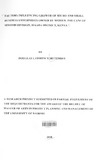| dc.description.abstract | This study examined factors influencing growth of micro and small business enterprises owned by women in Mwimbi Division, Maara District, Kenya. Building on the 2004 Foreign Investment and Advisory Service (FIAS) report, 'improving, the commercial legal framework and removing administrative and regulatory barriers to investment', this study looked at the discriminatory barriers facing women in the division through a gender lens. The report made specific recommendations to address gender-related barriers in the context of on going government and donor initiatives to encourage private sector development as the key driver of poverty reduction and economic growth in line with the Kenya's Vision 2030 and Millennium Development Goals.
Addressing these constraints not only allowed women to make a full contribution to the economy but also to improve their livelihoods and those of their families and help create a more enabling environment for all businesses in Kenya. From the reviewed literature, it was noted that there is a significant difference in performance of women's enterprises vis-a-vis those of men. The study emphasized on legal and regulatory issues, promotion of women entrepreneurs, women's access to enterprise education and training, women's access to credit and financial services and women's access to markets. A descriptive survey design was adopted. This involved an examination of the state of affairs, describing, analyzing and reporting conditions that existed.
Data was collected using questionnaires and interview schedules. The project showed some important facts. First, MSEs, were of overwhelming importance in the Division as they accounted for more than 90% of all firms outside the agricultural sector. Second, the contribution of women entrepreneurs was still relatively low in MSEs. This could be attributed to factors such as complexity in business registration, low level of formal education, inadequate women entrepreneurship promotions, inadequate enterprise education and training, inaccessible credit and financial resources and insufficient market information. Finally, there were no MSE development programmes specifically towards female entrepreneurs in the Division. It is concluded that women in micro and small business enterprises face multiple gender related barriers which need to be addressed at all levels, from the legal system to the domestic system. | en_US |

